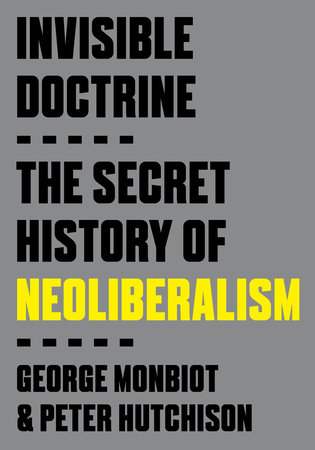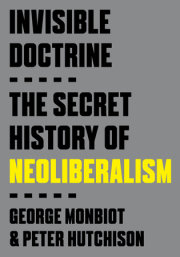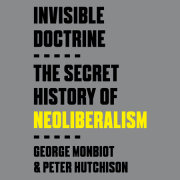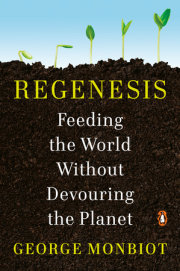1.
The Anonymous Ideology Imagine that the people of the Soviet Union had never heard of Communism. That’s more or less where we find ourselves today. The dominant ideology of our times—which affects nearly every aspect of our lives—for most of us has no name. If you mention it, people are likely either to tune out or to respond with a bewildered shrug: “What do you mean? What’s that?” Even those who have heard the word struggle to define it.
Its anonymity is both a symptom and a cause of its power. It has caused or contributed to most of the crises that now confront us: rising inequality; rampant child poverty; epidemic diseases of despair; off-shoring and the erosion of the tax base; the slow degradation of healthcare, education, and other public services; the crumbling of infrastructure; democratic backsliding; the 2008 financial crash; the rise of modern-day demagogues, such as Viktor Orbán, Narendra Modi, Donald Trump, Boris Johnson, and Jair Bolsonaro; our ecological crises and environmental disasters.
We respond to these predicaments as if they occur in isolation. Crisis after crisis unfolds, yet we fail to understand their common roots. We fail to recognize that all these disasters either arise from or are exacerbated by the same coherent ideology—an ideology that has, or at least had, a name.
Neoliberalism. Do you know what it is?
So pervasive has neoliberalism become that we no longer even recognize it as an ideology. We see it as a kind of “natural law,” like Darwinian selection, thermodynamics, or even gravity—an immutable fact, a nonnegotiable reality. What greater power can there be than to operate namelessly?
But neoliberalism is neither inevitable nor immutable. On the contrary, it was conceived and fostered as a deliberate means of changing the nature of power.
2.
The “Free” Market What is neoliberalism? It’s an ideology whose central belief is that competition is the defining feature of humankind. It tells us we are greedy and selfish, but that greed and selfishness light the path to social improvement, generating the wealth that will eventually enrich us all.
It casts us as consumers rather than citizens. It seeks to persuade us that our well-being is best realized not through political choice, but through economic choice—specifically, buying and selling. It promises us that by buying and selling we can discover a natural, meritocratic hierarchy of winners and losers.
“The market,” it contends, will—if left to its own devices—determine who deserves to succeed and who does not. The talented and hardworking will prevail, whereas the feckless, weak, and incompetent will fail. The wealth the winners generate will trickle down to enrich the rest.
Neoliberals argue that an active state seeking to change social outcomes through public spending and social programs rewards failure, fuels dependency, and subsidizes the losers. It creates an unenterprising society, run by bureaucrats, who stifle innovation and discourage risk-taking, to the impoverishment of us all. Any attempt to interfere with the market’s allocation of rewards—to redistribute wealth and improve the condition of the poor through political action—impedes the emergence of the natural order, in which enterprise and creativity are rightly rewarded. At the same time, neoliberals contend that government intervention and bureaucratic control will inevitably lead to tyranny, as the state gains ever more power to decide how we should live.
The role of governments, neoliberals claim, should be to eliminate the obstacles that prevent the discovery of the natural hierarchy. They must cut taxes, shed regulation, privatize public services, curtail protest, diminish the power of trade unions, and eradicate collective bargaining. They must shrink the state and blunt political action. In doing so, they will liberate the market, freeing entrepreneurs to generate the wealth that will enhance the lives of all. Once the market has been released from political restraints, its benefits will be distributed to everyone by means of what the philosopher Adam Smith called the “invisible hand.” The rich, he claimed:
. . . are led by an invisible hand to make nearly the same distribution of the necessaries of life, which would have been made, had the earth been divided into equal portions among all its inhabitants, and thus without intending it, without knowing it, advance the interest of the society.
It is fair to say that it hasn’t quite worked out like this. Over the past forty years, during which neoliberalism has prevailed both ideologically and politically, wealth—far from trickling down—has increasingly become concentrated in the hands of those who already possessed it.2 As the rich have grown richer, the poor have grown poorer, and extreme poverty and destitution now blight even the richest nations. And while the state might have deregulated finance and other commercial sectors, leaving their bosses free to behave as they wish, it has reasserted control over other citizens—intruding ever further into our lives as it stifles protest and restricts the scope of democracy.
Even on its own terms, as this book will show, neoliberalism has failed—and failed spectacularly. It has also inflicted devastating harm on both human society and the living planet, harm from which we’re at risk of never recovering. In terms of the spread and reproduction of its worldview, however, it has been astonishingly successful.
Over the years, we have internalized and reproduced neoliberalism’s creeds. The rich have allowed themselves to believe they’ve secured their wealth through their own enterprise and virtue—conveniently overlooking their advantages of birth, education, inheritance, race, and class. The poor likewise have internalized this doctrine and begun to blame themselves for their situation. They become defined, from within as well as without, as losers.
So never mind structural unemployment: if you don’t have a job, it’s because you’re unenterprising. Never mind the impossible costs of rent: if your credit card is maxed out, it’s because you’re incompetent and irresponsible. Never mind that your school has lost its playing field or you are living in a food desert: if your kid is fat, it’s because you’re a bad parent.
The blame for systemic failure is individuated. We absorb this philosophy until we become our own persecutors. Perhaps it’s no coincidence that we’ve seen a rising epidemic3 of self-harm and other forms of distress, of loneliness, alienation, and mental illness.
We are all neoliberals now.
Copyright © 2024 by George Monbiot. All rights reserved. No part of this excerpt may be reproduced or reprinted without permission in writing from the publisher.







